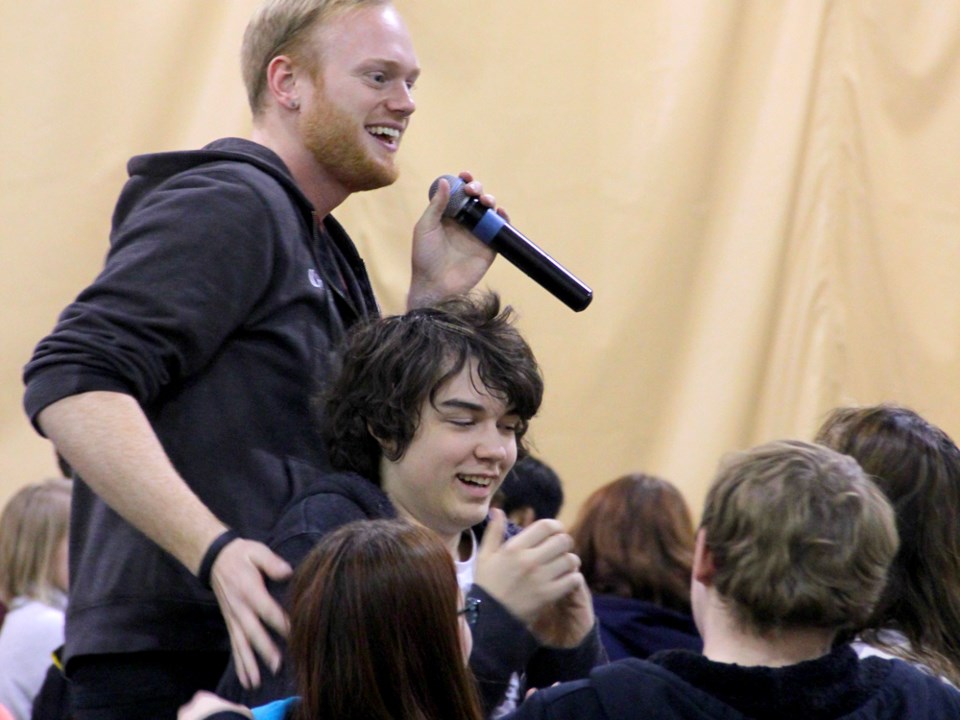Challenge Day returned to the Estevan Comprehensive School on Dec. 17 and 18 to welcome the Grade 9 class to the day-long events that teach the students it’s OK to open up.
For Challenge Day leader Chris Heinze, this year’s event marked his return to Estevan after attending to the Comp last year as part of the Challenge Day team.
“It was the same great energy. They’re just so wonderful,” he said about the first day back in Estevan. “They really find a way and open up to each other in different ways. There’s a lot of ‘this is who I really am.’ I just find this community to be so open.”
Heinze commented on the growing diversity in Estevan, which has seen a growth in visible minorities in recent years. He said it was heartening to see students not use those differences as barriers.
“It’s really cool to see the students come together despite that diversity, despite maybe the separation they may see in the community or in this room, and really embraced each other. It was really wonderful.”
While Challenge Day is simply a celebration of diversity, a time to learn about the similarities everyone has rather than their differences, it’s more than just an opportunity to bridge thoughts and feelings across cultures.
What the experience really challenges people to do is to be open to new ideas and to be open toward how they feel. Nobody has to be ashamed, and everyone can open up to a community that’s willing to accept them.
“We let them know that for a lot of their life they’ve been told to keep a lot of stuff inside. We let them know they don’t have to do that. Just because other people are doing it, doesn’t mean they have to follow that cycle. And through that information, it’s somehow empowering, and I don’t know how that happens,” Heinze said with a laugh. “I don’t take credit for that. I just pass on the information.”
When young people learn it’s OK to express themselves, he said that’s a good thing. It’s good for a free flow of ideas, for helping someone go through a difficult time and it’s important in order to have a richer, closer community.
“When everybody starts to feel safe enough to express who they are, we find we have more in common, and then we find out it’s great to get to know each other for who we really are, not for what we see or what we think we know about people,” said Heinze.
Nancy Zeleny has been organizing the local event along with Southeast Advocates for Employment where she works and said the mix of students and adults is a great way to build a sense of community in students and their adult peers.
“The point of having the adult participants involved is that we’re bringing school and community together. That’s so important. Often times youth will see adults in their community as authority figures, but this (provides) an equal playing field. Any activity the students do, the adult participant does as well,” said Zeleny.
“That just breaks down a lot of barriers. It opens up the bridges of communication for adults and youth in the community.”
Heinze said the day usually starts with a lot of energy, fun activities and dancing. When the students enter the gym, where they will spend the rest of the day, they are greeted by the enthusiastic adults who have volunteered to experience the day with them.
Heinze said it’s called the day of roller coasters because it starts with noise and energy in the hopes of opening up the students and then breaks into more intimate and quieter sessions before a final crescendo of hugs to cap off the day.
While this atmosphere may not be something that all of the students are interested in, Heinze said all of them are “in choice,” meaning they can choose how they show up and will be welcomed for however they do. Challenge Day, it is hoped, can plant a seed or two of change.
“It all starts with you. We talk a lot about cycles, cycles of oppression, cycles of behaviour within our families, our cultural cycles, the things that happen,” said Heinze. “What we try to encourage them to understand or to think about is that they have a choice of what they want their life to look like. They have the choice of how they treat other people and how they treat themselves. It’s not always easy to change those habits, but we’re hopefully planting seeds for them to do that.”




